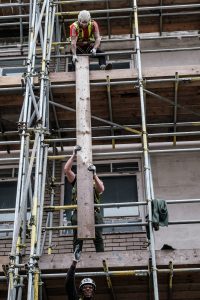CIS Subcontractors: Are You Claiming Your Full Tax Refund?
4 mins
Tax Preparation Specialist Provides Guidance on Allowable Expenses

CIS Subcontractors – are you claiming your full tax refund?
Due to the impact of Covid19 on the Self Assessment deadline for tax year 2019/20, many construction industry (CIS) subcontractors are only now turning their attention to their tax return for tax year 2020/21. Due to the way tax is deducted for subcontractors, the majority will find that they are due a tax refund. Tax preparation specialist David Redfern, director of DSR Tax Refunds Ltd, provides his guidance to help subcontractors ensure that their Self Assessment tax returns are completed efficiently and all allowable expenses have been accounted for.
Construction subcontractors are classed as self-employed workers, rather than employees taxed via the PAYE scheme. However, due to Construction Industry Scheme (CIS) rules, they are taxed 20% at source and these deductions are taken directly from their earnings by their CIS contractor. These CIS regulations were introduced to cut down on the perceived under-reporting of income in the construction industry but many subcontractors, when their business expenses are considered, are due a refund on those tax deductions. Redfern stated, “When it comes to their allowable expenses, subcontractors can often miss out on a wide range of business costs which, when added up, can increase the amount of their tax refund considerably – and for those CIS subcontractors who haven’t yet completed their 2020/21 tax return, now is a great time to get started”. Because CIS subcontractors are considered to be self-employed, they can claim a diverse range of business costs as tax relief such as mileage costs, tools and materials as well as home office expenses.
Due to the nature of the construction industry, expenses relating to travel are often substantial. Mileage to construction sites can soon add up and because most subcontractors base their business at their home address, this means that the majority of their work journeys will be allowable expenses rather than non-allowable commuting. Redfern explained, “There are two ways that a subcontractor can claim their motoring and mileage expenses – either using actual costs or using HMRC’s approved mileage rates. If using actual costs, you will need the evidence to back up the amounts claimed as expenses as well as determining the proportion of business travel in the vehicle. Whichever method you use, you can only claim for business travel, not personal; you must be using your own vehicle, and you will be required to continue to use the same method in subsequent tax returns until you change vehicle”. HMRC will require evidence of the travel, such as mileage logs. In addition to mileage costs, there may also be accommodation and subsistence expenses incurred as a result of working away from home. Contrary to popular belief, HMRC has not set a flat-rate system of expenses to simplify these claims and all expenses must be supported by receipts.
In addition to travel expenses, many subcontractors will incur business costs from providing their own tools, equipment and material. These may also include safety equipment and clothing they are expected to provide themselves. Redfern stated, “If the subcontractor is responsible for providing any of their own equipment – whether it is tools, materials or their safety gear – this is considered an allowable expense, even if the equipment is hired rather than purchased. For larger equipment purchases, it might be that capital allowances are a more appropriate way of accounting for those expenses but HMRC will expect receipts or invoices for all equipment and materials claims”.
As well as expenses which are particular to the construction industry, most subcontractors will also have incurred the usual expenses of most self-employed business owners, such as administration costs and fees for professional services. Redfern explained, “Whether it is expenses from providing your own home office or professional fees such as business insurance, bank charges or accountancy fees, these are all allowable expenses on your tax return and if forgotten, as so many subcontractors do as they focus purely on their construction expenses, can add up to quite a sizeable overpayment of tax”.
CIS subcontractors who have not yet completed their 2020/21 Self Assessment tax return are encouraged to contact DSR Tax Refunds Ltd on 0115 795 0232 as soon as possible in order to obtain specialist CIS tax preparation. Their website includes a wealth of resources for construction workers.
About DSR Tax Refunds Ltd
DSR Tax Refunds Ltd is a firm of tax preparation experts who specialise in CIS tax returns for construction workers working within the Construction Industry Scheme (CIS) as well as employees who are eligible to claim a tax refund for their work-related expenses, including employees working from home as a result of the Covid19 pandemic. Their friendly and helpful team can help with all relevant paperwork to ensure clients claims are handled in an accurate and efficient manner.
For more about DSR Tax Refunds Ltd, visit https://tax-refunds.co.uk/
For media enquiries, please email info@tax-refunds.co.uk or call 0115 795 0232
DSR Tax Refunds Ltd
Registered Office: Ground Floor, Seven Mile House, 1 Mansfield Road, Papplewick, Nottingham, NG15 8FJ